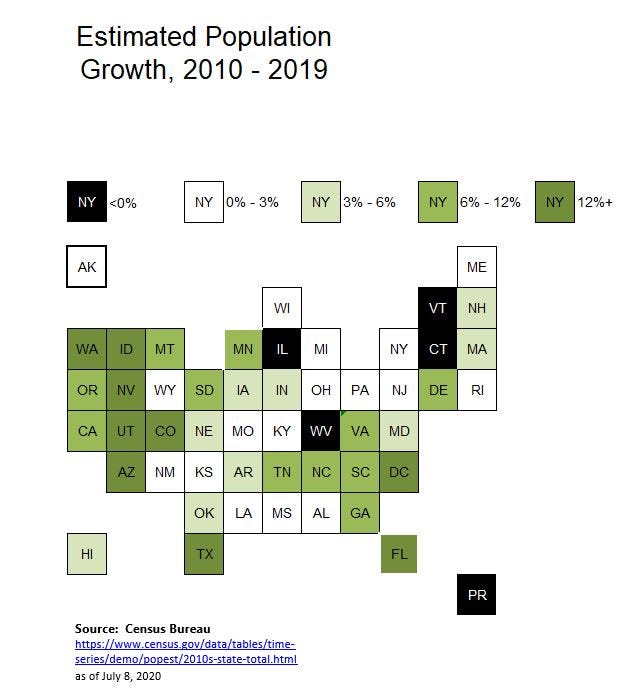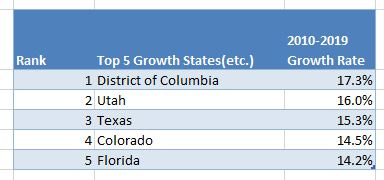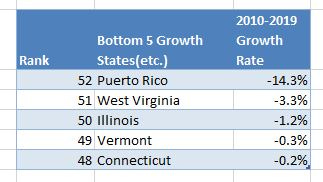Data Quickie: 2020 U.S. Census and Likely Population Changes
Some states have seen population decreases
A tweet from someone set me off down a path to seek some data.
In particular, 2020 is an official Census year, and the “Census Day” is April 1, 2020. I’ve already filled out the Census waaaay back in April, but if you’re an American and haven’t done this yet, you can go here.
Census response rates


It’s not great that only 62% of households have responded. I believe this is pretty typical though for self-response, and the issue is they don’t have the Census workers out pounding the pavement to fill in the holes. So that should be interesting.
House of Reps seats on the line
The main upshot of the official decadal Census, though, is to apportion seats for the states in the House of Representatives.

So let’s check what the population change has been.
Estimated population change 2010-2019
I used these estimates for the following results:

I picked the color scale because the overall U.S. population growth over 2010-2019 was at about 6%.
Top growth areas:

I do not feel good about DC being the top location for growth. To be sure, their population isn’t involved in the reapportionment that will occur. Also, only two states have smaller populations: Vermont and Wyoming. And those folks get one Rep and two senators. Hmm, maybe that idea of ceding the emaining portions of residential DC back to Maryland ain’t a bad idea.
But looking at all those other hot growth places… I blame air conditioning and sunscreen for those results.
Lowest growth areas:

I included Puerto Rico in this analysis, which also does not have Congressional representation with voting power, and we can see how horribly the population has cratered there. The year-by-year projections show the population winnowing away from 2010 until 2018, with a dead cat bounce in 2019.
But think about it: the overall country grew 6% in population, and you couldn’t even make 0? Even when similarly sized states grew by double-digit percentages?
Connecticut by all rights should lose at least one Congressional seat. And that’s even before doing any fancy math.
How will this end up?
The thing is, in most years, less than 2/3 of the Census results are self-reported. It’s Census workers bugging people individually where they get that exact enumeration.
The Census Bureau said that there will be a “soft launch” in July:
Door knocking by census takers at the homes of people who haven’t yet responded to the 2020 census is scheduled to start next month [July] with a “soft launch,” while a previously postponed count of the homeless will take place in September, U.S. Census Bureau officials said Friday.
….
For three days in September, census takers will go to homeless shelters, soup kitchens and places where people are known to sleep outdoors to count people experiencing homelessness. That operation also was supposed to have taken place at the end of March but was postponed because of the pandemic.In-person interviews in remote parts of northern Maine and southeast Alaska will resume later this month [June] after being halted in mid-March because of the spread of the new coronavirus. The bureau also stopped census takers in mid-March from dropping off paper forms to households in rural areas, but that work resumed last month.
So there’s that.
And there’s this: THE CENSUS IS REOPENING TOO: WORKERS FEAR BEING SACRIFICED TO CORONAVIRUS FOR THE SAKE OF A SPEEDY TALLY
With New York, along with the rest of the U.S., reopening after months of pandemic shutdowns, most census offices have restarted the sprawling operations that were put on pause in March and April. But observers are raising questions about whether the census will be safely carried out, with infection rates rising again in cities like Houston and regions like the Southeast and door-knockers now scheduled to carry out their work at the peak of hurricane season.
…..
Time is of the essence. The census is meant to provide a snapshot of the U.S. on April 1 of the year of the count. Delays erode the quality of the data, and the census is already far behind schedule.The U.S. Constitution indicates that the census should be completed by December 31. That deadline has now been extended to April 30, 2021. And the collection phase, which culminates with door-knockers visiting homes that have not responded, will conclude at the end of October, rather than the end of July. That last phase is critical to reaching historically undercounted demographics, such as immigrants and American Indians.
I don’t see that one really needs to get too close to people to get the answers they need. They primarily need to know the count of persons in the household. That’s it. For the “exact enumeration”, my understanding is that everybody counts, no matter their immigration status, age, or anything else. They just need to be human and living at a particular location as of a certain date. That location could be a park bench.
To be sure, the specific complaints in the piece are for people who work in office buildings… but again, do they really have to be in a specific office? They can call from anywhere if it’s just phone followups.
There’s something weird going on with a couple top-level hires, so I do wonder about that.
In any case, for Connecticut:

Well, that may not be true. Some bigger states with anemic growth may lose seats, but we shall see. It does get a bit complicated, as even the smallest states get at least one representative, and then you can’t allocate half a seat to a state.
The issue is Connecticut has 5 seats, and have a population size smackdab in the middle of the distribution of population size by state. If they lose a seat, that’s because several others around its size also have. It may have a good chance to hang onto its 5 reps.
But only if they get everybody counted.



